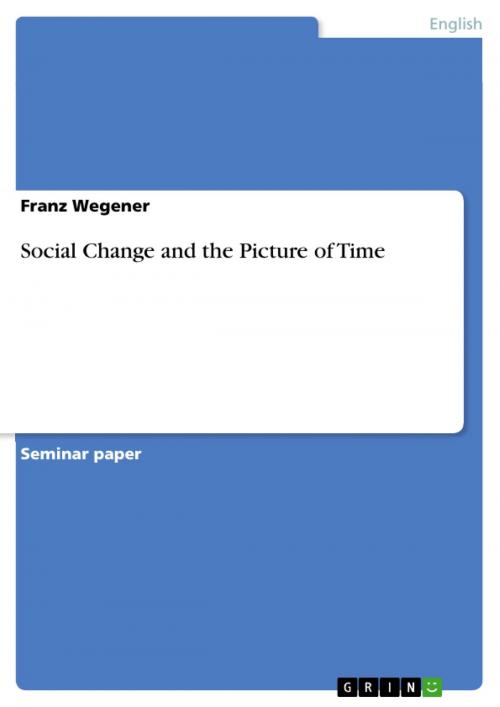Social Change and the Picture of Time
Nonfiction, Reference & Language, Study Aids, ESL, Foreign Languages| Author: | Franz Wegener | ISBN: | 9783638509220 |
| Publisher: | GRIN Verlag | Publication: | June 11, 2006 |
| Imprint: | GRIN Verlag | Language: | English |
| Author: | Franz Wegener |
| ISBN: | 9783638509220 |
| Publisher: | GRIN Verlag |
| Publication: | June 11, 2006 |
| Imprint: | GRIN Verlag |
| Language: | English |
Seminar paper from the year 2005 in the subject English Language and Literature Studies - Culture and Applied Geography, grade: very good (1,0), Otto-von-Guericke-University Magdeburg (Institut für fremdsprachliche Philologien), course: Time in Cultures - Cultures in Time (Culture Studies), 19 entries in the bibliography, language: English, abstract: The organization of time is not merely a matter of managing tasks, but also closely related to the notion of time prevalent in a certain culture. This explains why pictures of time increasing its pace occur in western societies even though neither the days nor the lives of people become shorter. In this work, it is shown that the notion of time is affiliated with specific moral values influencing the way things are handled and the things people strive for. Through an examination of the different concepts of time prevalent in the Middle Ages and in the late eighteenth century (specifically Hegel's philosophy of time), specific moral values of these societies are revealed. These moral values strongly influence decision making in short-term as well as in long-term issues. They inspire the goals people have for their lives and they affect the management of everyday life activities. This work also uses these cultures as examples of how to make this connection between the notion of time, the morality, the living conditions and the way specific issues are dealt with.
Seminar paper from the year 2005 in the subject English Language and Literature Studies - Culture and Applied Geography, grade: very good (1,0), Otto-von-Guericke-University Magdeburg (Institut für fremdsprachliche Philologien), course: Time in Cultures - Cultures in Time (Culture Studies), 19 entries in the bibliography, language: English, abstract: The organization of time is not merely a matter of managing tasks, but also closely related to the notion of time prevalent in a certain culture. This explains why pictures of time increasing its pace occur in western societies even though neither the days nor the lives of people become shorter. In this work, it is shown that the notion of time is affiliated with specific moral values influencing the way things are handled and the things people strive for. Through an examination of the different concepts of time prevalent in the Middle Ages and in the late eighteenth century (specifically Hegel's philosophy of time), specific moral values of these societies are revealed. These moral values strongly influence decision making in short-term as well as in long-term issues. They inspire the goals people have for their lives and they affect the management of everyday life activities. This work also uses these cultures as examples of how to make this connection between the notion of time, the morality, the living conditions and the way specific issues are dealt with.















